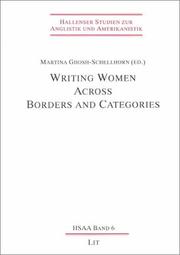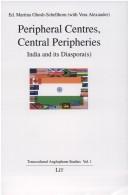| Listing 1 - 5 of 5 |
Sort by
|
Book
ISBN: 9783868210996 Year: 2008 Publisher: Trier : WVT Wissenschaftlicher Verlag Trier,
Abstract | Keywords | Export | Availability | Bookmark
 Loading...
Loading...Choose an application
- Reference Manager
- EndNote
- RefWorks (Direct export to RefWorks)
It has been customary to speak of the British colonial project and its present-day reverberations in terms of cultural clash and ensuing resistance on the part of the colonised. In challenging that perspective, this study regards the concept of hybridity as historically pertinent to the first contact situation, and thus moves beyond an intercultural premise to a transcultural one in addressing the effects of Anglicisation. It posits that the contemporary parameters of identity formation in the colonially-incepted Anglophone world can best be understood as deriving from the state of "transitionality". Since the most comprehensive treatment of "transitional identity" is found in the self-narratives of writers located in transitionality, the genre of autobiography forms the focus of this study. As canonical autobiography theory is informed by premises found to have little relevance to "transitionality", these highly individuated autobiographies, which stem moreover from a wide variety of global regions, are here analysed with the help of a fresh theory of autobiography. As a result, the significance of "transitional autobiography", not only for reconsidering postcolonial theory, but also for re-conceptualisation of literary self-representation, has been brought to the fore.
MOI --- IDENTITE (PSYCHOLOGIE) --- IDENTITE COLLECTIVE --- POSTCOLONIALISME --- AUTOBIOGRAPHIE (GENRE LITTERAIRE) --- ETUDES POSTCOLONIALES = POST COLONIAL STUDIES --- INTERCULTURALITE --- DANS LA LITTERATURE --- COMMONWEALTH

ISBN: 3825846393 Year: 2000 Publisher: Münster : LIT Verlag,
Abstract | Keywords | Export | Availability | Bookmark
 Loading...
Loading...Choose an application
- Reference Manager
- EndNote
- RefWorks (Direct export to RefWorks)
Generally held to be rigid, borders and categories are nonetheless expanded when those bounded by the demarcations of hegemony, challenge its strictures. Significant instances of this constructive transgression can be found in the women's writing with which this collection of essays by international critics engages. Whereas in travel writing by women (Sarah Hobson, Dervla Murphy, Jan Morris) `transgression' is seen to have settled into a familiar strategy, in autobiography (Ann Fanshawe. Margaret Cavendish, Christine Brooke-Rose), cultural analysis (Virginia Woolf, Marianna Torgovnick, Donna Haraway), and fiction (Michelle Cliff, Jeanette Winterson, Ellen Galford, Fiona Cooper), women have succeeded in creating an innovative space for themselves.
Boundaries in literature. --- Literature --- Women in literature. --- Women authors --- History and criticism.

ISBN: 3825892107 9783825892104 Year: 2006 Publisher: Münster : LIT,
Abstract | Keywords | Export | Availability | Bookmark
 Loading...
Loading...Choose an application
- Reference Manager
- EndNote
- RefWorks (Direct export to RefWorks)
Prominent scholars in literary and cultural studies, anthropology, sociology, linguistics, media studies, theatre production, and translation challenge the centre-periphery dichotomy used as a paradigm for relations between colonizers and their erstwhile subjects in this collection of critical interventions. Focussing on India and its diaspora(s) in western industrialized nations and former British colonies, this volume engages with topics of centrality and/or peripherality, particularly in the context of Anglophone Indian writing; the Indian languages; Indian film as art and popular culture; cross-cultural Shakespeare; diasporic pedagogy; and transcultural identity.
DIASPORA --- INDIENS --- ETUDES POSTCOLONIALES = POST COLONIAL STUDIES --- TRANSNATIONALISME --- INDE --- A L'ETRANGER --- EMIGRATION ET IMMIGRATION
Book

ISBN: 3111714144 9783111714141 3484401400 Year: 2016 Publisher: Tübingen
Abstract | Keywords | Export | Availability | Bookmark
 Loading...
Loading...Choose an application
- Reference Manager
- EndNote
- RefWorks (Direct export to RefWorks)
English philology --- English language --- English literature --- Study and teaching --- History and criticism --- Germanic languages
Digital

ISBN: 9783111714141 9783484401402 Year: 2016 Publisher: Tübingen Max Niemeyer Verlag
Abstract | Keywords | Export | Availability | Bookmark
 Loading...
Loading...Choose an application
- Reference Manager
- EndNote
- RefWorks (Direct export to RefWorks)
| Listing 1 - 5 of 5 |
Sort by
|

 Search
Search Feedback
Feedback About UniCat
About UniCat  Help
Help News
News